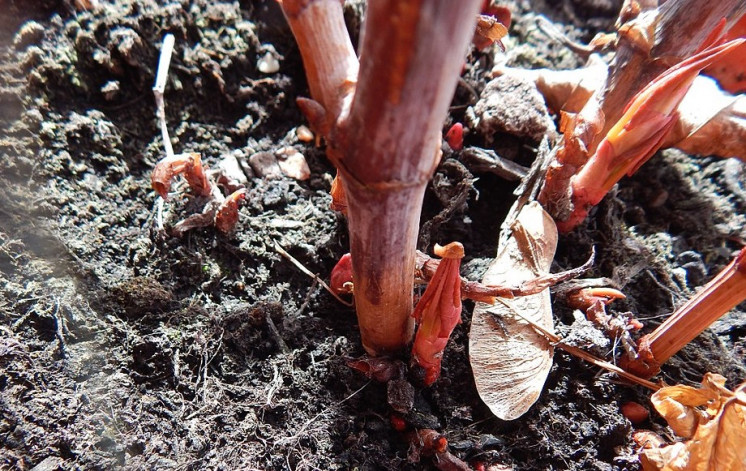
Japanese Knotweed - Invasive Species // Edible Delight
The path to disaster was planted with good intentions. Japanese Knotweed (Fallopia japonica) was introduced to the US by well-meaning botanists looking to beautify with this decorative planting. Japanese Knotweed is attractive with its red shoots, heart-shaped leaves, and white-flower blossoms, but knotweed has a killer's instinct - suffocating native plantings and infiltrating gardens. Just watch how fast it grows in 15 days!
Identify and EAT . . .
Vermont is infested with knotweed, but there's good news - it's delicious, so you can eat and eradicate at the same time! If you're new to wildcrafting, knotweed is a great place to start as it is easy to identify and you need not worry about overharvesting! Just make sure you completely remove the plant, and never compost or introduce it back to the environment to stop the spread. You need to harvest shoots when they're tender enough to snap off with a clean break, before the plant gets tough and woody. Young knotweed tastes similar to rhubarb and you can eat it raw or cooked and prepare it sweet or savory. Read up on chefs around the world in this knotweed expo in Bon Appetit.
On the Menu . . .
You can find knotweed on the menus of Vermont chefs Kevin Lasko of The Backroom and Vermont Farms Catering in Pittsfield and Michael Bove of in Waitsfield. Living on the edge of the Green Mountain National Forest means Chef Kevin Lasko finds his wild edibles on his morning run. "The plant is heavy-duty and looks like asparagus when it's young." Chef Kevin described, "the flavor is very acidic and identical to rhubarb." Chef Kevin likes to make a jam out of the knotweed for a knotweed jam and fresh ricotta toast that he serves as a cocktail hour hors-d'oeuvre. Chef Michael maximizes the "lemony flavor" of knotweed and likes preparing the knotweed simply by grilling and searing the shoots to accompany fish.
Learn more . . .
On Saturday, May 5th, from 3 to 4 pm, the Vermont Fresh Network will take an in-depth look at eating invasives at the Vermont Wildcrafting Conference in Burlington. Hear from chefs, gatherers, and experts in a panel discussion on making use of non-native plants in the kitchen.
On Sunday afternoon, May 6th, expert Melanie Brotzl leads a workshop on Japanese Knotweed. Identify, dig, prepare and discuss the nutritional and medicinal properties of the plant.













